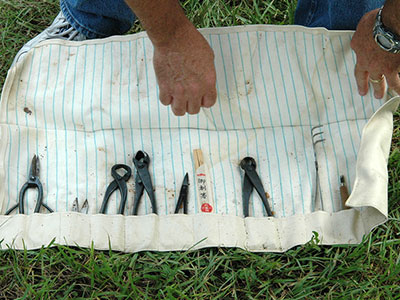Disinfecting Your Garden Tools
 Get ready for spring and the busy gardening season ahead by taking some time to disinfect your horticultural tools. Regularly disinfecting your tools is a good way to prevent disease from spreading in your landscape. There are multiple products available; regardless of which you choose, it’s always important to read and understand label instructions before using any cleaning product.
Get ready for spring and the busy gardening season ahead by taking some time to disinfect your horticultural tools. Regularly disinfecting your tools is a good way to prevent disease from spreading in your landscape. There are multiple products available; regardless of which you choose, it’s always important to read and understand label instructions before using any cleaning product.
Disinfecting and sterilizing your horticultural tools is a good way to prevent the spread of disease-causing pathogens in your landscape. There are a number of products that can be used to disinfect tools and gardening surfaces, and each has advantages and disadvantages.
Cleaning and disinfecting are two distinct steps. Cleaning involves physically removing soil and debris and is the first step prior to disinfecting your tools. Soil and other organic residues reduce the effectiveness of disinfectants. Before disinfecting, always remove dirt, debris, or sap by wiping your tools with a damp cloth or paper towel.
Household Disinfectants
The advantages to using household disinfectants, such as Lysol, to clean are that they’re easy to find and most aren’t corrosive. The disadvantage is that little research has been done regarding their effectiveness against plant pathogens. Additionally, household disinfectants are relatively expensive when compared to other disinfectants that can be used on horticultural tools. How you use household disinfectants will vary depending on what product you are using. Generally you will want to apply a full strength spray or dip; always be sure to read the label first. Commercial household disinfectants are widely available at a variety of stores.
Chlorine Bleach
Chlorine bleach is inexpensive, effective, and easy to find. However, it is corrosive, can produce harmful fumes, and isn’t as effective against viruses as some other products. To use chlorine bleach to disinfect horticultural tools, mix up a 10% bleach solution (one part bleach to nine parts water) and do a 30-minute soak. The solution has a short lifespan—effectiveness is cut in half after two hours—so fresh batches should be made for each round of cleaning .Rinse tools with clean water after soaking to prevent corrosion.
Ethanol or Isopropyl Alcohol
The advantages of alcohol (ethanol or isopropyl) to sanitize your gardening tools is that it can be used as a wipe (no soaking necessary), you don’t have to rinse the product off, and it’s immediately effective. The disadvantage of alcohols? They’re very flammable. To disinfect your tools with alcohol you can either wipe or dip them in a solution that is 70–100% alcohol. Ethanol and isopropyl alcohol are widely available at a variety of stores.
Get ready for spring and the busy gardening season ahead by taking some time to disinfect your horticultural tools. Regularly disinfecting your tools is a good way to prevent disease from spreading in your landscape. There are multiple products available; regardless of which you choose, it’s always important to read and understand label instructions before using any cleaning product.
If you need help regarding your landscaping, we at Garden Services are fully licensed & insured to handle all your irrigation, landscaping, lawn maintenance and tree service needs whether it’s a residential, commercial landscaping or homeowner association property. If you ever have any comments or questions, please don’t hesitate to call or email me and I’ll be happy to answer any questions that you might have. Special thanks to UF/IFAS extension for some helpful information provided in this post. Until next month Happy Gardening!
